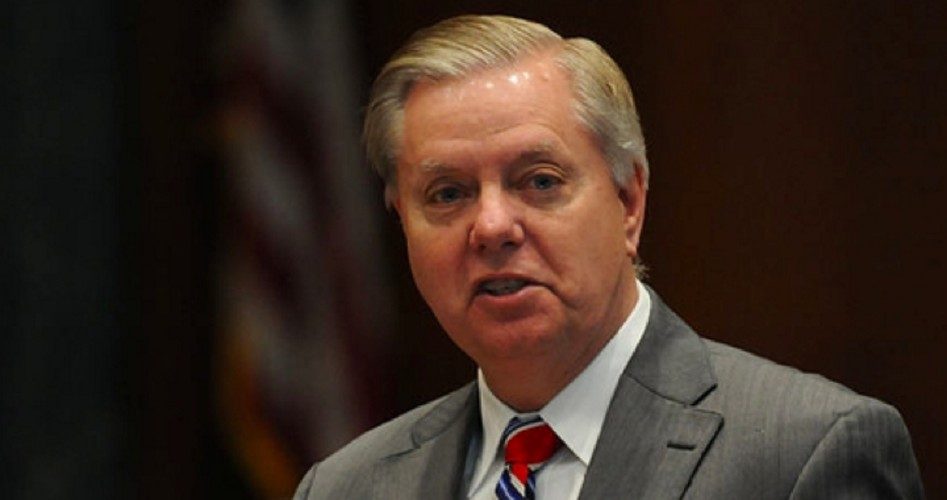
South Carolina Republican Senator Lindsey Graham (shown) will oppose the proposed continuing resolution (CR) to keep the federal government funded if the measure fails to authorize the U.S. Export-Import Bank to make loans over $10 million.
The Ex-Im Bank takes money plundered from U.S. taxpayers and loans it to overseas organizations committed to purchasing American goods.
Not surprisingly, the bank caters to cronies and their craving of corporate welfare. The bank makes most of its big loans to billion-dollar businesses such as Boeing and General Electric, not to struggling companies that could benefit from the largesse.
The blog The Hill reports on Graham’s promise to prop up the banksters:
“I will not vote for a Continuing Resolution which does not contain a fix for the Export-Import (EX-IM) Bank. We are losing American jobs to foreign competitors for no good reason,” Sen. Lindsey Graham (R-S.C.) said in a statement….
Graham added Thursday [Sept. 22] that including the bank fix in the CR is necessary because “we need a fully functioning EX-IM Bank to help ensure American manufacturers are able to compete in the international marketplace on a level playing field.”
The South Carolina Republican warned earlier this month that including the provision would likely determine how he would vote on the continuing resolution. He’s one of the first Senate Republicans to buck the GOP spending bill only hours after leadership filed it.
An article published by Rare reveals why Graham is so keen on keeping the Export Import Bank flush with federal funds:
The “fix” that Graham is talking about is changing a quorum rule to allow the bank, which has filled just two of the five seats on its board, to approve loans over $10 million. It’s currently blocked from doing so because it doesn’t have a quorum.
One of the biggest beneficiaries of the rule change would be Boeing, which has a factory in South Carolina. Earlier this year, Boeing’s CEO called on Congress to appoint the necessary board members to make loans over $10 million. The Ex-Im bank has been called “Boeing’s bank” because the aerospace manufacturer has been its biggest corporate beneficiary.
According to the Center for Responsive Politics, Boeing is one of Lindsey Graham’s biggest supporters. The company has donated $43,293 to his campaigns since 2011.
John F. McManus, president emeritus of The John Birch Society, provides context on the creation of the Ex-Im Bank that reveals the socialist side of its functions:
The Ex-Im Bank began courtesy of an executive order signed by President Roosevelt in 1934. (Unconstitutionally making law with the stroke of a pen isn’t something new!) Originally, its chief beneficiary was the murderous cabal running the Soviet Union.
During the emergence of Communist China as an economic powerhouse in the 1980s, the Bank provided millions to the Beijing regime. Example: In September 1982, the Reagan administration approved a loan of $68.4 million to finance the building of a steel mill in the People’s Republic. Reagan approved the deal by signing a document stating that the transaction was “in the national interest of the United States.”
Similar deals had already been approved by the Nixon administration for Communist Russia, by the Ford administration for Communist Yugoslavia, Romania, and Poland, and by the Reagan administration for these same Communist tyrannies. Simply put, the Ex-Im Bank has been one of communism’s best friends.
Supporters of the Bank claim that it actually earns money for the U.S. Treasury when loans are repaid with interest. If these deals are profitable, why is a government-run bank needed? Wouldn’t private megabanks be willing to provide the cash if a profit were available?
Congressman Tom McClintock (R-Calif.) made good sense when he opposed reauthorization of the Bank: “The Export-Import Bank dragoons American taxpayers into subsidizing loans to foreign companies making it cheaper for them to buy products from politically favored American companies.” He noted that past beneficiaries included “such upstanding enterprises as Solyndra and Enron,” both of which turned out to be expensive failures paid for by U.S. taxpayers.
Beyond the benefits reaped by U.S. mega corporations, Ex-Im has helped to fuel the transfer of numerous industrial enterprises from the United States to foreign nations. The jobs of many Americans have been lost and American manufacturing leadership has continued to fade away, partly due to the work of the Ex-Im Bank.
Hardly anyone wants to ask where in the U.S. Constitution an entity such as the Ex-Im Bank derives its authorization. As is the case with so many other federal agencies and departments, there is none.
Senator Heidi Heitkamp (D-N.D.) has also indicated she will join Graham in fighting to kill the continuing resolution unless it increases the lending power of the Ex-Im Bank.
“Heitkamp has been pushing both members of the Democratic caucus and calling on Republicans in the House and Senate to support including Ex-Im in the CR, and at this point she is not planning on voting for the CR without it,” an aide said, according to the report in The Hill.
On September 22, Senate Majority Leader Mitch McConnell (R-Ky.) proposed a measure that would keep the federal funds flowing at the same rate as last fiscal year. The bill also provides funds for fighting the Zika virus and for the victims of the floods in Louisiana.
Democrats have indicated that they will not vote for the GOP-backed bill, insisting on waiting for a bipartisan resolution.
To constitutionalists, all of these pet projects — the Ex-Im Bank, Zika funding, and flood relief — are equally egregious, none of them being authorized by the enumerated powers granted to Congress in the Constitution.
Photo: Sen. Lindsey Graham

